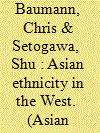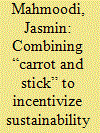|
|
|
Sort Order |
|
|
|
Items / Page
|
|
|
|
|
|
|
| Srl | Item |
| 1 |
ID:
139459


|
|
|
|
|
| Summary/Abstract |
The emergence of ethnic markets has been rapid following the growing trend of intra-national diversity in developed nations. These new markets have attracted researchers to investigate the role of ethnicity in consumer behaviour; however, to date, literature has focused on the role of the origin of tangible goods/products. In contrast, ethnic marketing for services has gained little attention. This study fills this gap by investigating the effect of ethnicity of service staff on consumers’ preferences for services. These effects are tested for the four service types identified in Lovelock’s service classification scheme. This study examined consumers’ preferences in services based on the ethnicity/racial category of service staff (Caucasian, Chinese, Indian and Korean) and service type (Medical, Education, Financial and Cleaning). A shopping mall intercept survey included a sample of 471. Multivariate analysis of variance was applied to test for significant variances between the mean preferences. Significant differences in preferences for the ethnicity of service staff were empirically established. Consumers, regardless of their ethnicity, prefer service staff of the same ethnicity. This creates a gap between preferences for one’s own ethnicity and preferences for others. This tendency was especially strong in medical services. Consumers’ preferences for service staff ethnicity are explained by the theories of country of origin, animosity, homophily and language. This study encourages service providers to make use of ethnic marketing, since a better match between service staff and customers’ preferences results in less miscommunication and better cultural understanding. Training on cultural sensitivity is also encouraged. This study establishes the important role of the country of origin in services. We name this the ‘country of origin of service staff (COSS)’ effect.
|
|
|
|
|
|
|
|
|
|
|
|
|
|
|
|
| 2 |
ID:
143393


|
|
|
|
|
| Summary/Abstract |
A survey was conducted among 1489 consumers in seven pilot cities designated by the Chinese Ministry of Commerce for constructing a meat circulation traceability system.This study set four attributes for pork: traceability information, quality certification, appearance, and price. The preferences and willingness to pay (WTP) of consumers for traceability information, quality certification, appearance attributes, and influencing factors were investigated using choice experiments. According to results from both mixed logit and latent class models, quality certification was the most important characteristic, followed by appearance, and traceability information. “Government certification,” “very fresh-looking,” and “traceability information covering farming, slaughter and processing, circulation and marketing” were the most preferred levels of quality certification, appearance, and traceability information, respectively. Significant heterogeneity was observed in the consumer preferences for these attributes. The preferences and WTP of consumers for traceability information and quality certification were significantly influenced by age, monthly family income, and education level.
|
|
|
|
|
|
|
|
|
|
|
|
|
|
|
|
| 3 |
ID:
162276


|
|
|
|
|
| Summary/Abstract |
Electrical utilities are a main stakeholder for achieving sustainable policy goals. Effective tariff designs that incentivize electricity savings among consumers can contribute to fulfilling these goals. Prior research suggests that penalties are more effective in promoting behavior change, which can be explained by insights from behavioral economics: Loss aversion describes that people react more strongly to losses (penalties) than to rewards of the same magnitude and go greater lengths to avoid them. However, in markets where consumers freely choose their preferred tariff, it remains a major challenge to persuade consumers to voluntarily subscribe to penalizing tariffs. The present study employed a choice experiment using choice-based conjoint analysis to examine consumer preferences for electricity tariffs that apply a combination of rewards and/or penalties for electricity consumption. Results from a representative sample of Swiss electricity consumers show that consumers prefer tariffs that reward decreases in electricity consumption, rather than tariffs that penalize increases in consumption, but that tariffs combining rewards and penalties achieve substantial potential market acceptance. Direct tariff attractiveness ratings additionally support these findings showing that consumers perceive combined Bonus-Malus tariffs as sufficiently attractive. Future research avenues and implications for marketing strategies and energy policies are discussed.
|
|
|
|
|
|
|
|
|
|
|
|
|
|
|
|
| 4 |
ID:
177446


|
|
|
|
|
| Summary/Abstract |
While several countries progress in the energy transition, the social acceptance of new infrastructures becomes increasingly important. We focus on market acceptance, and study the preferences of Swiss households with respect to selected energy sources used for electricity generation. By applying a hybrid discrete choice model with latent variables on stated preference data, we assess households’ preferences with respect to the price, origin, and reliability of their electricity supply, and evaluate the impact of demographic, behavioural, and attitudinal drivers thereon. Latent variables representing attitudes allow us to explicitly model psychological traits otherwise unobservable from the data, evaluate their impact on individual choices, and connect them with demographic or behavioural variables. We find that households evaluate variations in the price and reliability of supply differently, depending on the energy source used. Environmental concern is associated to a stronger interest in a generic 100% renewable-based supply, informed optimism to a higher acceptance of nuclear generation. Energy illiteracy and environmental-friendly habits are more frequent among environmentally conscious households, less so among the informed optimists. Measures to foster energy literacy and ensure transparency of energy supply contracts are recommended in order to elicit or maintain consensus, and achieve the desired energy policy goals.
|
|
|
|
|
|
|
|
|
|
|
|
|
|
|
|
| 5 |
ID:
125597


|
|
|
|
|
| Publication |
2013.
|
| Summary/Abstract |
This paper presents a utility-based and a regret-based model of consumer preferences for alternative fuel vehicles, based on a large-scale stated choice-experiment held among company car leasers in The Netherlands. Estimation and application of random utility maximization and random regret minimization discrete choice models shows that while the two models achieve almost identical fit with the data and differ only marginally in terms of predictive ability, they generate rather different choice probability-simulations and policy implications. The most eye-catching difference between the two models is that the random regret minimization model accommodates a compromise-effect, as it assigns relatively high choice probabilities to alternative fuel vehicles that perform reasonably well on each dimension instead of having a strong performance on some dimensions and a poor performance on others.
|
|
|
|
|
|
|
|
|
|
|
|
|
|
|
|
| 6 |
ID:
177348


|
|
|
|
|
| Summary/Abstract |
Nearly one-quarter of global greenhouse gas emissions are from the transport sector and around 30% of this are from road freight transport. Seeking to diversify the energy matrix and to reduce air pollution, we studied performance, emissions, and advantages/disadvantages of several alternative fuels compared to the conventional one (Diesel). This paper aims to analyze the driver's view about the use of Liquefied Natural Gas (LNG) in freight transport and set policy recommendations about it. A survey was conducted through a structure questionnarie in São Paulo (Brazil) to evaluate different aspects related to truck drivers in the use of LNG fuel technology. The results show that despite the lack of knowledge on LNG trucks, most of the respondents related it to an environmentally friendly and more economic option. Despite the higher purchase price, 68% of them would pay a loan for a longer period to acquire the technology. The main aspect about buying a conventional truck is safety (22.4%), however for LNG trucks, a tax reduction (23.1%) is the most crucial one. Lack of knowledge is a considerable barrier to the introduction of LNG for freight transport regarding technology, performance, prices, maintenance, and safety, which represent uncertainty when acquiring the technology.
|
|
|
|
|
|
|
|
|
|
|
|
|
|
|
|
| 7 |
ID:
166310


|
|
|
|
|
| Summary/Abstract |
This article examines Korean consumer responses towards second-generation lignocellulosic bioethanol. Consumer surveys were conducted in the Korean cities of Seoul, Incheon, Bucheon, Gwangju, Seongnam and Suwon with three information treatments for the purpose of this study. The survey collected data on consumers’ willingness to pay (WTP) for this product, their driving patterns, knowledge about renewable energy, acceptance of relevant government policies, and demographic characteristics. A dichotomous-choice contingent valuation methodology is used to estimate WTP for this product and investigate factors that affect consumer choice. The findings include that the average respondent in the sample is willing to pay a 4.3% premium over second-generation bioethanol compared to conventional fuel. The mean premium is highest (6% premium) for respondents who received information about positive environmental effects of the advanced fuel. Being female and higher income positively affect WTP. Also higher self-reported knowledge about renewable energy sources and higher valuation of environmental friendliness positively affect WTP for advanced bioethanol.
|
|
|
|
|
|
|
|
|
|
|
|
|
|
|
|
|
|
|
|
|